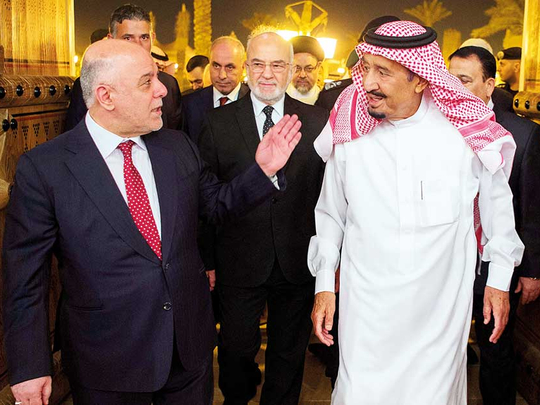
Riyadh: Iraqi Prime Minister Haider Al Abadi and Saudi King Salman held the first meeting of the joint Saudi-Iraqi coordination council in Riyadh on Sunday, which observers say aims to thwart Iran’s influence in the region.
Al Abadi hailed the meeting as an “important step toward enhancing relations”, echoing similar comments from King Salman.
“We are facing in our region serious challenges in the form of extremism, terrorism as well as attempts to destabilise our countries,” the Saudi monarch said.
“These attempts require our full attention.”
US Secretary of State Rex Tillerson participated in the inaugural meeting of the Saudi Arabia-Iraq Coordination Committee, along with Saudi King Salman and Iraqi Prime Minister Haider Al Abadi, telling the leaders that the event highlighted the improving ties between the longtime rivals and showed “the great potential” for further cooperation.
He noted the August reopening of a major border crossing and the resumption of direct flights between Riyadh and Baghdad.
“Both represent the beginning of what we hope will be a series of even more tangible actions to improve relations and strengthen cooperation on a host of issues,” he said.
“Your growing relationship between the kingdom and Iraq is vital to bolstering our collective security and prosperity and we take great interest in it.”
The United States is “grateful for this progress and urge you to expand this vital relationship for the stability of the region,” Tillerson said.
“The United States stands ready to support continued cooperation between Saudi Arabia and Iraq and we congratulate you.”
His participation in the meeting comes as US officials step up encouragement of a new axis that unites Saudi Arabia and Iraq as a bulwark against Iran’s growing influence in the region.
Amid the push for that alliance, the Iraqi government is struggling to rebuild recently liberated Daesh strongholds and confronts a newly assertive Kurdish independence movement.
History, religion and lots of politics stand in Tillerson’s way, but both the Saudi king and the Iraqi prime minister appeared optimistic about the prospects.
“We reaffirm our support for the unity and stability of our brother country of Iraq,” King Salman said.
Al Abadi expressed pleasure with “the thriving relations between our two brotherly countries.”
“We are open and we want to move away from the past,” he said.
“The region cannot tolerate any further divisions. Interference in the internal affairs of other state should stop.”
Iraq and Saudi Arabia, estranged for decades after Saddam Hussain’s 1990 invasion of Kuwait, have tried in recent years to bridge their differences.
Saudi Arabia reopened its embassy in Baghdad in 2015 after a quarter century. The first visit by a Saudi foreign minister to Baghdad came in February this year, followed by the border crossing reopening in August and resumption of direct flights between the capitals suspended during the Gulf War.
Over the weekend, the Saudi oil minister, Khalid Al Falih, made a high-profile appearance at Baghdad’s International Fair, and held talks with his Iraqi counterpart, Jabar Al Luabi.










